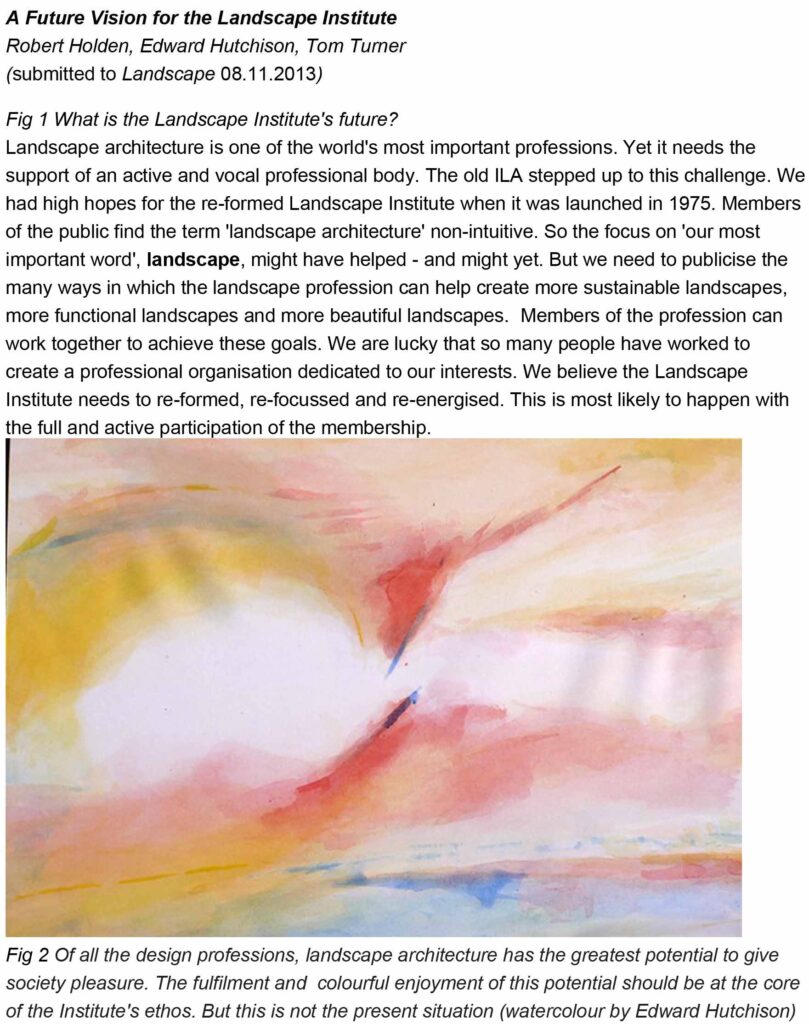Future Vision for the UK Landscape Institute LI

Future Vision for the Landscape Institute UK
This article by Robert Holden, Edward Hutchison and Tom Turner was written in response to a general request from the then president of the LI for articles about the its future. It was submitted to the journal Landscape in 2013 but was not selected for publication. The article is published here for record purposes and as a contribution to present debate about how the LI might evolve. Landscape_Institute_Future_Vision_06.11.2013-. The content of the article arose from many debates about the LI’s future by Reform Group members. The group was set up after the Institute had suffered a financial crisis in 2009, convened and chaired by Edward Hutchison. It comprised two former presidents of the LI (Hal Moggridge and Brian Clouston) and approximately 30 senior members of the Landscape Institute.
Landscape Institute LI Reform post-2009
There was also a discussion about LI Reform the LI on the members forum (Talkinglandscape.org) to which I submitted An agenda for changing the LI on July 13, 2009. It is only accessible to LI members on TL so here are the recommendations which I made on, approximately, the 40th anniversary of my joining the Institute of Landscape Architects (which became the Landscape Institute) – so I have now been a member for ‘half a century’:
Lets be positive. After the useful discussions on Talking Landscapes, I offer the following agenda for changing the Landscape Institute:
ELECTORAL REFORM
1. The first and foremost requirement is to convert the LI into an effective participatory democracy.
2. All candidates for Council should stand for election on manifestos (expressed as texts, podcasts or videocasts)
3. Elections to all posts should be free, with no longevity restrictions on who can stand.
4. Those who are elected should take up their positions immediately (not after 2 years).
5. Significant decisions under consideration, by Council and by the Branches, should be aired on the TL Forum, inviting members to comment
My hope is that these measures will increase the number of candidates and the number of voters at Council and Branch elections, thus reducing the LI’s democratic deficit.
TRANSPARENCY
Any LI financial data which does not have to be confidential should be made accessible to members online, so that everyone can share in the responsibility for scrutiny, and the consequences of decisions, particularly with regard to resource allocation and expenditure data (both fixed and variable).
ADMINISTRATIVE REFORM
1. When taking on new employees, the LI should give preference to qualified landscape architects with a deep understanding of, and hopefully a long-term commitment to, the well-being of the landscape profession
2. The Central London office should be closed as soon as possible, and plans made for low cost accommodation at a location central to the British Isles (eg Nuneaton, which has low rents combined with good rail, air and road connections).
3. We should aim to become as much of a ‘virtual’ (web-based) organization as we can, with as little as possible spent on staff and offices.
4. Full consideration should be given to outsourcing business processes and using Skype-type video conferencing instead of physical meetings
5. One council meeting/year should be held during the Chelsea Flower Show (eg in a hospitality tent) to show our ongoing commitment to the theory and practice of the discipline from which our profession has sprung: garden design.
RESOURCE ALLOCATION
The LI should allocate fewer of its resources to ‘status symbols’ (eg a prestige address, a large staff and a glossy journal) and more of its resources to influencing public debate and decision-making. We should explain how the landscape of town and country can be conserved and improved – and how the landscape profession can contribute to this mighty task.
INFORMATION RESOURCES
Since we are a knowledge-intensive and skills-intensive profession, we should allocate more money to the Library, to the Archive and to other Information Resources. Books and other information should be made available by post, in digital format and via the web. This is how we can become a highly-skilled profession. The LI’s offices should have a green roof and should contain extensive information resources, to encourage it to act as a Think Tank. All our publications should be edited from this resource base – they should not be produced by specialists in company reports. We should review all books of potential interest to landscape architects – so that their publishers get into the habit of sending us free copies for our members to read as postal loans.
PUBLICATIONS
1. We should make publishing a major aspect of the LI’s activities, as it once was.
2. The paper journal, Landscape, should be replaced by a range of high quality online publications, mostly written and mostly edited by landscape architects. There can be provision for Print-On-Demand (POD) for those who prefer print editions.
DEVOLUTION
More resources and more responsibility should be devolved to the Branches, particularly for policy making, because context-sensitive design (by Consulting the Genius of the Place) is at the absolute heart of landscape design.
EDUCATION
1. We should resolve the ‘problem of the specialisms’ immediately and do everything we can to support, for example, landscape planning, environmental assessment, garden design and urban design. Educational programmes should be accredited and work experience should count on the Pathway to Chatership, which would look great on the resumes of so many people, provided that they have contacted somewhere like www.arcresumes.com to give them a helping hand with their resume.
2. Landscape Management should require the same length of education as the other specialisms.
3. Consideration should be given to incorporating an element of voluntary work, for the benefit of landscape architecture, in the P2C programme. It could be for the LI or for local communities.
POLICY STATEMENTS
As large a proportion of the membership as possible should become involved in writing, illustrating and promulgating policies relating to the landscape of town and country.
Tom Turner, July 2019
